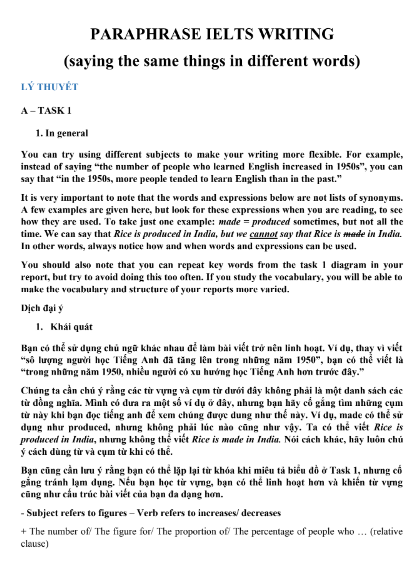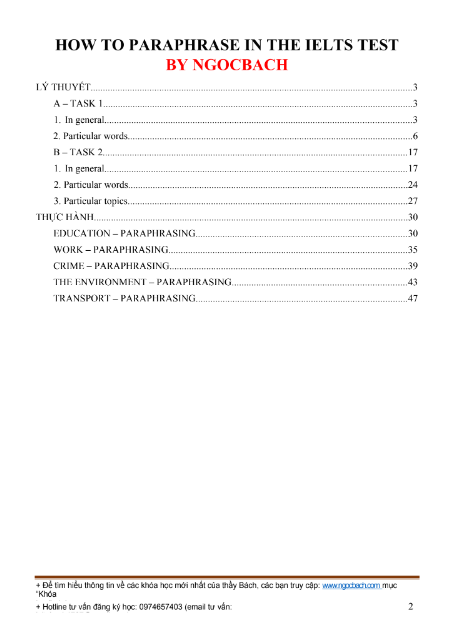


Mục lục
ToggleA. TASK 1
1. In General
Bạn có thể sử dụng chủ ngữ khác nhau để làm cho bài viết trở nên linh hoạt hơn.
Ví dụ:
- Thay vì viết: “The number of people who learned English increased in the 1950s.”
→ Viết lại thành: “In the 1950s, more people tended to learn English than in the past.”
Lưu ý:
Các từ và cụm từ dưới đây không phải là danh sách từ đồng nghĩa tuyệt đối.
Một số từ chỉ có thể thay thế trong ngữ cảnh cụ thể.
Ví dụ:
- Rice is produced in India ✅
- Rice is made in India ❌
Bạn có thể lặp lại từ khóa trong biểu đồ, nhưng tránh lặp quá nhiều. Học từ vựng theo cụm giúp đa dạng hóa cấu trúc và từ ngữ trong bài viết.
Cấu trúc 1: Subject refers to figures – Verb refers to increases/decreases
| Cấu trúc | Nghĩa tiếng Việt |
|---|---|
| The number of / The figure for / The proportion of / The percentage of people who … | Số lượng / Số liệu / Tỉ lệ / Phần trăm những người … |
| The number of / The figure for people + V-ing | Số lượng / Số liệu những người đang … |
| There was an increase / rise / growth in the number of … | Có sự tăng trong số lượng … |
| There was a decrease / drop / fall / decline in the number of … | Có sự giảm trong số lượng … |
Ví dụ:
- In 1999, the proportion of people using the Internet in the USA was about 20%.
- There has been an increase in the cost of coffee.
- The number of people going to college rose to 5 million.
- The figure for people who like to go to Mexico in the summer increased last year.
- There was a rise in the percentage of children born by C-section.
- There was a decrease in the number of hospitals.
Cấu trúc 2: Subject refers to the chart
| Cấu trúc | Nghĩa tiếng Việt |
|---|---|
| The chart / graph / illustration / map / table shows / illustrates / gives information about / provides information about / compares … | Biểu đồ / hình minh họa / bảng thể hiện / minh họa / cung cấp thông tin / so sánh … |
Ví dụ:
- The chart shows a change in the percentage of international students among university graduates in different Canadian provinces between 2001 and 2006.
Cấu trúc 3: Subject refers to what is shown in the chart
| Cấu trúc | Nghĩa tiếng Việt |
|---|---|
| People tend to + V | Mọi người có xu hướng làm gì |
| X is the most popular … | X là … phổ biến nhất |
| Company A reduced its waste production | Công ty A đã giảm lượng chất thải |
| The … is highest | … là cao nhất |
| People show their preference for … | Mọi người thể hiện sự yêu thích với … |
| People have a tendency to do sth | Mọi người có xu hướng làm gì đó |
Ví dụ:
- People in Britain spent just over £170,000 on photographic film, which is the highest figure shown on the chart.
- The consumption of chocolate in the Middle East was higher than in India.
- People showed their preference for travelling to work by car rather than by bus or train.
2. Particular Words
A Period of Time
| Cấu trúc | Nghĩa tiếng Việt |
|---|---|
| during the period between X and Y | trong khoảng thời gian giữa X và Y |
| between X and Y | giữa X và Y |
| from X to Y | từ X đến Y |
| during the 1950s | trong những năm 1950 |
| within five years from X to Y | trong vòng 5 năm từ X đến Y |
| over the period from X to Y | trong khoảng thời gian từ X đến Y |
| over a period of 17 years | trong 17 năm |
| during the researched/observed period | trong thời gian được nghiên cứu |
| at the beginning/end of the period shown | vào đầu/cuối giai đoạn |
Ví dụ:
- The divorce rate peaked in 1980 at nearly 1.5 million divorces before falling to 1 million at the end of the period.
- London experienced by far the greatest changes in house prices over the 13-year period.
Age Group
| Cấu trúc | Nghĩa tiếng Việt |
|---|---|
| between X and Y years old | giữa X và Y tuổi |
| X- to Y-year-olds | nhóm X – Y tuổi |
| people aged X to Y | người trong độ tuổi X đến Y |
| people who fall into / belong to the X to Y age group | người thuộc nhóm tuổi X – Y |
| in their forties | ở độ tuổi 40–49 |
Từ thay thế:
- Old people → the elderly / senior citizens
- Young people → the young / teenagers / youngsters
- Middle-aged people → people aged 40–60
- People in early adulthood → people aged 20–40
Ví dụ:
- 12% of those aged between 14 and 16 were current smokers.
- People in their forties went to the cinema more frequently than elderly people.
Spending
| Từ loại | Cấu trúc | Nghĩa |
|---|---|---|
| Danh từ | spending = expenditure | chi tiêu |
| Động từ (chủ động) | spend = use one’s money | chi tiêu, dùng tiền |
| Động từ (bị động) | be spent on = be allocated for = be used for | được chi cho / được phân bổ cho |
Ví dụ:
- Around $800 per person was spent on IELTS books by Vietnamese consumers in 2017.
- Almost half of government spending was allocated for health and education.
Consumption
| Từ loại | Cấu trúc | Nghĩa |
|---|---|---|
| Danh từ | X consumption = X use / the amount of X used | lượng tiêu thụ X |
| Động từ | consume = use | tiêu thụ |
Ví dụ:
- Water consumption was considerably higher in Brazil than in the Congo.
- The quantity of ice cream consumed fell from 5000 to 3750 litres between 2004 and 2007.
Internet Usage
| Từ loại | Cấu trúc | Nghĩa |
|---|---|---|
| Danh từ | Internet usage / Internet users / people accessing the Internet | sử dụng Internet / người dùng Internet |
| Động từ | use = access = connect to | sử dụng / truy cập / kết nối |
Ví dụ:
- Almost 100% of Canadians used the Internet, compared to about 80% of Americans and 40% of Mexicans.
- The number of Internet users rose sharply in Vietnam after 2002.
Production
| Từ loại | Cấu trúc | Nghĩa |
|---|---|---|
| Danh từ | production / manufacture / generation | sự sản xuất |
| Động từ | produce = make = manufacture = generate | sản xuất / tạo ra (điện, năng lượng) |
Ví dụ:
- Total electricity production increased dramatically from 1980 to 2000.
- The amount of rice produced in Thailand increased by 25%.
Sales
| Từ loại | Cấu trúc | Nghĩa |
|---|---|---|
| Danh từ | sales = turnover | doanh thu |
| Động từ | earn = obtain = gain = make | kiếm được / đạt được / tạo ra |
Ví dụ:
- Company A obtained profits of $5 million, whereas Company B made profits of only $1 million.
- Shoe sales dropped by 12% after the new tax was introduced.
- Company A is predicted to earn $4000 next year, a gain of $1000 on this year’s turnover.
1. Poverty
Từ vựng và cấu trúc
| Từ loại | Cấu trúc tiếng Anh | Nghĩa tiếng Việt |
|---|---|---|
| Danh từ | Poverty rate = level of poverty = poverty level | Tỉ lệ nghèo = mức nghèo |
| Danh từ | poor people = the poor = people who live in poverty = people who live under the poverty line | Người nghèo = người sống trong nghèo khổ = người sống dưới mức nghèo |
Ví dụ
- Overall, 11% of Australians, or 1,837,000 people, were living in poverty in 1999.
→ Nhìn chung, 11% người Úc (tức 1.837.000 người) đang sống trong nghèo khổ vào năm 1999. - It is noticeable that levels of poverty were higher for single people than for couples.
→ Đáng chú ý là mức nghèo của người độc thân cao hơn so với các cặp đôi. - The number of poor people in the UK fell by 50,000 between 2012 and 2013.
→ Số lượng người nghèo ở Anh giảm 50.000 người trong giai đoạn 2012–2013. - The percentage of the poor aged over 70 remained at 3% between 2003 and 2008.
→ Tỉ lệ người nghèo trên 70 tuổi giữ nguyên ở mức 3% trong giai đoạn 2003–2008. - While the poverty rate fell in the UK during the period shown, it rose in France and Italy.
→ Trong khi tỉ lệ nghèo ở Anh giảm trong giai đoạn được thể hiện, thì lại tăng ở Pháp và Ý. - The graph compares the level of poverty among the elderly in four Asian countries.
→ Biểu đồ so sánh mức nghèo của người cao tuổi ở bốn quốc gia châu Á.
2. Unemployment
Từ vựng và cấu trúc
| Từ loại | Cấu trúc tiếng Anh | Nghĩa tiếng Việt |
|---|---|---|
| Danh từ | people who were unemployed = people who were jobless = people without a job = the unemployed = the jobless | Người thất nghiệp = người không có việc làm |
| Danh từ | level(s) of unemployment = unemployment rate | Mức độ thất nghiệp = tỉ lệ thất nghiệp |
Ví dụ
- The percentage of people without a job in Vietnam was around 18% in 2015.
→ Tỉ lệ người không có việc làm ở Việt Nam là khoảng 18% vào năm 2015. - The level of unemployment increased among graduates in the arts, but fell among science graduates.
→ Tỉ lệ thất nghiệp tăng ở sinh viên tốt nghiệp khối ngành nghệ thuật, nhưng giảm ở khối ngành khoa học. - The table compares the numbers of the unemployed from 2002 to 2005 in six European countries.
→ Bảng số liệu so sánh số người thất nghiệp từ năm 2002 đến 2005 tại sáu quốc gia châu Âu. - The jobless total decreased between 1990 and 2010 in the USA.
→ Tổng số người thất nghiệp tại Mỹ giảm trong giai đoạn 1990–2010. - Unemployment rates increased dramatically during the period shown in the chart.
→ Tỉ lệ thất nghiệp tăng đáng kể trong giai đoạn được thể hiện trên biểu đồ.
3. Transportation
Từ vựng và cấu trúc
| Từ loại | Cấu trúc tiếng Anh | Nghĩa tiếng Việt |
|---|---|---|
| Danh từ | car ownership | Việc sở hữu ô tô |
| Cụm danh từ | people who have cars / people who own a car | Người có hoặc sở hữu ô tô |
| Cụm danh từ | people who use cars = people driving to work = people who commute by car = people who travel by car = car users = people with cars | Người sử dụng ô tô / người đi làm bằng ô tô / người di chuyển bằng ô tô |
Ví dụ
- The number of people who commute by car rose slightly in the next three years.
→ Số lượng người đi làm bằng ô tô tăng nhẹ trong ba năm tiếp theo. - The graph illustrates that car ownership in Vietnam increased greatly from 1980 to 2005.
→ Biểu đồ cho thấy việc sở hữu ô tô ở Việt Nam đã tăng đáng kể từ năm 1980 đến 2005. - According to the table, the proportion of people who have cars is significantly higher in India than in China.
→ Theo bảng số liệu, tỉ lệ người có ô tô ở Ấn Độ cao hơn đáng kể so với Trung Quốc.



